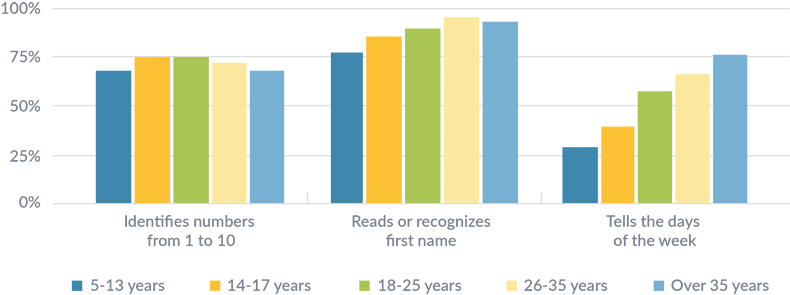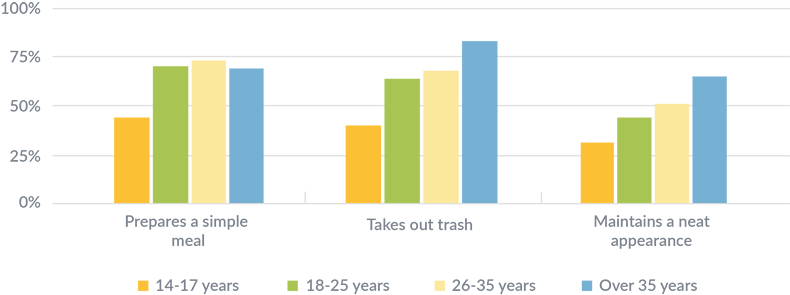Research Summary
A Comparison of Functional Academic and Daily Living Skills in Males with Fragile X Syndrome with and without Autism
Date Published: July 2018
What was the research about?
Adaptive skills are practical, everyday life skills that people of all ages need to take care of themselves and interact with other people. These skills are important for individuals with fragile X syndrome (FXS) to be independent.
In this research study, we looked at two types of adaptive skills in males of all ages with FXS:
- functional academic skills (like math and reading)
- daily living skills (like cooking and cleaning)
We wanted to know whether these skills differed by age and whether the skills of males with FXS were different from males who were co-diagnosed with autism spectrum disorder (ASD). We also looked at whether their skills were related to their living arrangement or job status.
What did the research team do?
We surveyed parents of males of all ages with FXS. We asked all parents to rate their son’s functional academic skills. Only parents of males ages 14 and older were asked to report on their son’s daily living skills. We also asked them if their son had autism, if he lived on his own or with a roommate, and if he had a job.
Who was in the study?
A total of 534 parents answered questions about their son's functional academic and daily living skills. These parents were mostly female, white, married, and on average about 49 years old. Their sons ranged in age from 5 to 67 years old, with an average age of 20. About 40% of their sons also had ASD.
534 males with FXS were included in the study
Males with FXS with and without ASD

40% Males with FXS and ASD
Ages of males with FXS
What did the research team learn?
Many males with FXS can do everyday tasks without help.
Common adaptive skills in males with FXS include:
Functional academic skills
Understanding time and money
and their importance
Identifying and counting numbers
from 1 to 10
Identifying familiar signs
Reading or recognizing their first
or last name
Using a pencil to write
Daily living skills
Preparing simple meals
Using a microwave
Doing household chores such as
taking out the trash and
doing laundry
Adaptive skills differ by age and type of skill.
As expected, more adult males had mastered adaptive skills than younger males. However, the age at which most males mastered skills differed depending on the task. For example, functional academic skills such as identifying numbers from 1 to 10 were often learned during childhood (5 to 13 years). More than half of all males were able to read or recognize their first name in childhood, however males continued to learn this skill into adulthood. Other skills, such as telling the day of the week, were not learned by most males until early adulthood or later (18 to 25 years and older). See Figure 1 for more details.
Figure 1. Functional academic skills by age in males with FXS ages 5 and older

| 5-13 years | 14-17 years | 18-25 years | 26-35 years | Over 35 years | |
|---|---|---|---|---|---|
| Identifies numbers from 1 to 10 | 68% | 75% | 75% | 72% | 68% |
| Reads or recognizes first name | 77% | 85% | 89% | 95% | 93% |
| Tells the day of the week | 29% | 39% | 57% | 66% | 76% |
Daily living skills were also mastered at different ages, starting in early adolescence and into adulthood. For example, preparing a simple meal and taking out the trash were learned by some adolescent males (14 to 17 years old), but by young adulthood many males were able to do this skill. Males also continued to make progress in learning other skills, such as maintaining a neat appearance.
Figure 2. Daily living skills by age in males with FXS ages 14 and older

| 14-17 years | 18-25 years | 26-35 years | Over 35 years | |
|---|---|---|---|---|
| Prepares a simple meal | 44% | 70% | 73% | 69% |
| Takes out trash | 40% | 64% | 68% | 83% |
| Maintains a neat appearance | 31% | 44% | 51% | 65% |
Males who had only FXS had more adaptive skills than males who had both FXS and ASD.
Males who had only FXS had more functional academic skills, such as following a schedule and knowing the value of coins and bills, than males who had both FXS and ASD. However, we did not find any differences between the two groups in some skills, such as choosing the appropriate restroom sign or making the bed.
Having more adaptive skills was related to being more independent, regardless of autism status.
Males who could perform functional academic and daily living skills without help were more likely to have a community job or live alone or with a roommate. This was the case whether a male was co-diagnosed with ASD, or not.
What does this mean for families?
Many males with FXS have adaptive skills and continue to learn skills into adulthood.
Our study showed that most boys and men with FXS have a variety of everyday life skills. Although some skills are mastered in childhood, many males with FXS continue to learn skills in their 20s, 30s, and beyond. Families of males with FXS can play an important role in helping their sons become more independent at any age by helping them learn functional academic and daily living skills.
Adaptive skills can help "close the gap."
Even though males with FXS tend to have more adaptive skills than males who are co-diagnosed with ASD, this does not mean that males who have both FXS and ASD will not be independent. In fact, the study suggests that by learning adaptive skills, males with FXS and ASD can be just as independent as those with only FXS.
Related resources
Resources to support your child’s functional academic skills:
- Educational Guidelines for Fragile X Syndrome: General (National Fragile X Foundation)
List of general guidelines for supporting your child’s education through the years. - Preparing Youth with Autism Spectrum Disorder for Adulthood A Transition Toolkit for Educators (Columbia Regional Program)
Practical information as well as online tools to support children with autism for independent living and community participation. - Teach Self-care Skills to Children with Special Needs (Verywell Family parent website)
Overview of life skills, why they are important to children with special needs, and strategies for teaching them. - Educational Resources (National Fragile X Foundation)
Educational resources such as books/DVDs, websites, and smartphone and tablet apps.
Resources to support your child’s daily living skills:
- Fragile X Syndrome: A Guide for Parents (FRAXA Research Foundation)
Guide for families with children living with FXS, including a section on tips for activities of daily living. - Community Living (National Fragile X Foundation)
Tips and other resources for helping your child live independently. - Employment and Daily Activities (National Fragile X Foundation)
Tips and other resources for seeking employment and other daily activities for your child. - Adolescent and Adult Project (National Fragile X Foundation)
Videos and written resources to support your child’s transition to adulthood.
Read the full article by Dr. Raspa and colleagues
Source. Raspa, M., Franco, V., Bishop, E., Wheeler, A. C., Wylie, A., & Bailey, D. B. (2018). A comparison of functional academic and daily living skills in males with fragile X syndrome with and without autism. Research in Developmental Disabilities, 78, 1-14.